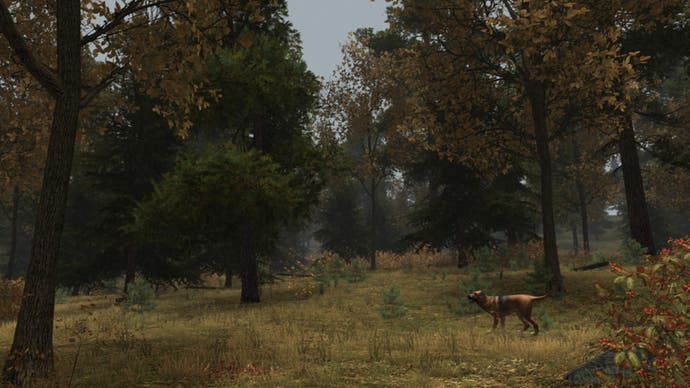The unsung story of USC's Tracy Fullerton
From Thoreau to immersive theatre, Hit Points shines a light on a remarkable career.
Hit Points, in case you haven't come across it before, is an incredible free newsletter from friend of Eurogamer and former Edge editor Nathan Brown, delivering insight and commentary on the videogame industry. We're delighted to be partnering with Nathan to provide a platform for some of his pieces, starting with this profile of Tracy Fullerton - not a widely known dev, but someone whose work has had a profound impact on the industry. If you like this and would like more, do head over and subscribe!
Today's subject is Tracy Fullerton, an experimental game designer, author and pioneering educator. I will be honest and admit I had never heard of Tracy until she popped up in my inbox a few months back, replying to that day's edition of Hit Points to say it had struck a chord with her. We got chatting and I am honestly ashamed I did not know who she was before that email arrived. Now, after an hour-long video call with her, I am amazed she is not a household name. Her impact on the game industry has been pretty significant.
By the end of this piece, I believe that you'll agree. But let us start, as is customary with these things, a little further back.
Tracy was born and raised in Los Angeles, and had a childhood of curiosity and creativity. Her father was a self-taught aerospace engineer, and their garage was filled with technological trinkets and toys. With her siblings and friends, she wrote and performed plays; she made comic books, kitbashed inventions, made films. When computers arrived at home, naturally, she fiddled around with coding, and started making games. "I got patted on the head a lot for being creative," she recalls.
She figured she'd make a career out of it. When it came time for college, games weren't an option; the medium was simply too young back then, and it wasn't something you could study. But you could certainly study film - and living in Los Angeles, the movie business exerted a certain pull. She studied theatre arts, English and film at the University of Southern California (USC). After graduation, she took a couple of jobs in the movie industry, but felt destined for a career in games. "I had a mixed background: in rudimentary, self-taught programming, traditional storytelling, and filmmaking," she says. "It was a really good mix of skills for getting into the game industry."
As it turned out, it was a movie job that got her into the games business. She pitched up to an interview one day. A friend had told her it was for a job on a documentary, but that wasn't quite the whole story. The company making it was called Synapse, founded by VFX pioneer Robert Abel. The documentary was about Christopher Columbus, and was interactive. The crew worked with cameras and early ATI video cards, blending video and navigable still images. The project, screened on LaserDisc and CD-ROM, is on permanent display at the National Library of Congress.
Tracy loved the work, and not just because of the innovative nature of it, or because it felt as much like game design as filmmaking. The structure of it appealed too. The movie business was long established, and thoroughly hierarchical: you started at the bottom and worked your way up the ladder, one rung at a time. This, by contrast, was new, different, and free-wheeling - just like her childhood had been. "The flat structure of early tech companies was really much more my style," she says. "Everyone was problem-solving every day, and you could really bring to bear different kinds of skills in different disciplines. It was super exciting."
She was hungry for more, but there weren't many opportunities at the time: you either worked for Robert Abel's Synapse, or for Bob Stein's Voyager. Then Tracy read a magazine article - either the Hollywood Reporter or Variety, the details are fuzzy - about a new company that wanted to make 'cinematic games'. She wrote a cold letter to the founder, and wound up moving across the country, becoming the creative director of Interfilm in New York. Funded at first by Sony, Interfilm's business model involved retrofitting movie theaters to allow for realtime audience participation, and making, as Tracy puts it, "several interactive movies of varying quality."
There was Mr Payback, directed by Back To The Future co-writer Bob Gale and starring Christopher Lloyd - a "very silly" movie about revenge in which the audience voted on how said revenge should be carried out. There was Ride For Your Life, which Tracy co-directed with Interfilm president Bob Bejan. Starring Adam West and Matthew Lillard, it was a knockabout "comic book brought to life" about two bicycle messengers and, somehow, an alien invasion; the audience voted every ten seconds on how the story should progress. There was Sony Wonder Saturdays, a matinee movie show for kids with pizza and a selection of thoroughly silly interactive short films.


Tracy loved the work, but the concept was short-lived. "It would have worked really well if you did it in a theme park or something like that - a place where people go to play," she says. "But putting it in theatres... people had a certain understanding of how things work in a movie theatre." They expect to be entertained, not to be involved. Interfilm went public but, as often comes to pass, it fell apart shortly after.
Next up was RG/A, short for Robert Greenberg & Associates, a CG company that was looking to move into games. Tracy became a founding member of RG/A Interactive, and soon found herself pitching to Microsoft what seemed, at the time, like a crazy idea: "Multiplayer, web-based games for a casual audience. It was 1993, there were like five people on the internet! But they went for it."
Microsoft, in the throes of redesigning MSN and looking for innovative software to bolster its appeal, commissioned Tracy to build NetWits, a series of simple online party games that launched as part of MSN 2.0 in 1996. Thanks to a sponsorship deal with Expedia, each night one lucky winner would get a free round-trip flight anywhere in the US. "The loser got a party lampshade. We literally handmade these 1950s-style lampshades to send out to the losers. Incredible."
Despite its modest reach in the internet Wild West of the mid-'90s, NetWits was a success: a couple of months after launch it was named TIME Magazine's Best Of The Web for 1996. Off the back of it, Sony approached RG/A, asking the team to reimagine classic game shows including Jeopardy! and Wheel Of Fortune for the "hipper, younger" audience on the web. Tracy was conscious of being pigeonholed, but didn't mind: "It was cool. They were amazing properties, and I was into it. It seemed like a fun thing to do. They became some of the most popular games on the internet back then."
In fact, she embraced the pigeonhole in which she found herself. This was new technology; there was evidently significant interest in it from some pretty major companies; and she was one of the few people around with the skills and experience to do it. And the dotcom boom was in full swing. Together with some friends, she built some custom technology that allowed massively multiplayer games to be synced with a live TV broadcast. They founded a company, Spiderdance, and were soon hard at work for clients including MTV, NBC and CBS. The MTV project, webRIOT, launched in 1999. It was a studio-based gameshow, with one contestant joining remotely over the internet. ("We had to be pretty picky with who our internet contestant of the day was," Tracy points out, "because hardly anyone had a webcam.") Spiderdance hooked up with The Weakest Link; it designed games to run around weekend-long James Bond marathons. Its games were available 24 hours a day, and its technology was reaching millions of simultaneous viewers. All was going swimmingly.
Then 9/11 happened, and everything fell apart. Spiderdance's funding came from TV show marketing budgets - and they were first to be gutted when the bubble burst. "We basically lost half our clients," Tracy says. "It was really sad. The technology was really cutting-edge, and the work was getting better and better, but we were so fragile as a startup. 9/11 really undercut us in ways we could never recover from."
Tracy moved on, flitting around short-term contracts and consulting gigs. She worked for a spell at Imagineering, designing interactive experiences and installations for, among others, the Epcot Center. She'd been a teacher part-time throughout her career, and had begun to turn her experiences into a book on teaching game design (the book, Game Design Workshop, was published in 2004). She had plenty of job offers, but she wasn't entirely sure what she wanted to commit herself to next.
She'd done work she was proud of; she'd broken new ground. But she had, if anything, been too far ahead of the curve, doing things that either the technology or the audience weren't quite ready for. It was time for some soul-searching. She hopped in her car and went on a 10,000 mile road trip around the US. Ringing in her ears throughout was a simple question; one I think we should all ask ourselves from time to time, whether we're at a career crossroads or not. What makes me happy?
The answer was her teaching work, and as a teller of stories I can see why she would arrive at that conclusion. The narrative just sort of fits. Teaching is eternal; it isn't beholden to investors, or technology, or the fickle whims of a particular audience. And if, like Tracy, you've spent your career to this point being five or ten years ahead of everyone else... what better way to put that to use than by devoting yourself to training the next generation of game makers, years before they enter the job market? There was only one problem. There still weren't many ways to study games at college. Tracy would have to build one.

She approached her alma mater, USC, about letting her build a game-design curriculum, using the film programme that Tracy had studied years before as a springboard. "I'd been through their programme of production, and I understood the way that they scaffolded the very complex set of learnings that go into media production. Games are much more complicated than films, but the underlying foundation - of training people how to be thoughtful, intentional media makers - is good, and was useful. A tonne of people, including myself, had gone to the School of Cinematic Arts, graduated and gone right into the game industry. So clearly a lot of the skills were directly applicable."
The second vital element came courtesy of Electronic Arts, whose CCO Bing Gordon was a big supporter of Tracy's idea. EA endowed a chair at what was now called the USC Interactive Media Division; Gordon was its first occupant, and brought with him a troupe of fellow EA execs who acted as a sort of unofficial board of directors, offering strategic direction and advice. Gordon had a particular request for Tracy - one that would end up shaping the curriculum just as much as the scaffolding she had borrowed from the film school. EA hired people fresh out of college all the time, but found that it took five years to turn a graduate into a productive team member. "He said, 'I would like you to take that five years and either cut it in half, or diminish it entirely. I would like you to send us people who are team-ready.'"
It wouldn't be enough to teach people how to make games: the programme would also need to ensure students were combat-ready by the time they entered the industry trenches. The curriculum, in other words, would need to mimic the process of making a commercial game as closely as possible.
So it has proven. At first, USC game students work alone, learning expressive techniques. Then they work in small teams, then medium-sized ones, and on it goes. By the time they're working on their final projects, they are essentially experiencing a real-world production schedule. Projects are pitched and greenlit, then put into production with a milestone plan. Oversight and advice comes from eight mentors, industry veterans in essential disciplines - direction, marketing, user research, all that. One of those mentors, former THQ president Danny Bilson, describes the programme as 'a big game industry LARP,' and I think that is pretty much perfect.

The results speak for themselves - and it is here, if you are wondering, that the stuff I said up top about Tracy being a superstar begins to crystallise. The list of people and projects that have passed through what is now known as the USC Interactive Media & Games Division in the past 15 years is a roll call of indie-game pin-ups. Asher Vollmer, creator of smash mobile puzzler Threes. Sean Plott, better known these days by his streaming handle, Day9. Susana Ruiz, creator of the award-winning serious game Darfur Is Dying. Perhaps the best known are Jenova Chen and Kellee Santiago, founders of Thatgamecompany, who made their foundational student projects Cloud and fl0w at USC - and whose 2012 PlayStation exclusive Journey was the game that turned indie games from support acts to headliners in their own right. I can't help but ask Tracy if she is, secretly, the fairy godmother of the indie-game boom.
"Sometimes I do wonder how I will go down in history," she smiles. "But you know, the people who matter to me know what I've contributed, and I feel good about that. Some people are better at... well, I've always tried to put the students forward. It's always been very important to me to put the students in the limelight, first and foremost."
I'll admit I'm on unfamiliar ground here. I've been talking to game developers for years, and while I've never made a game myself, I feel I have a pretty good handle on the theory, at least, if not the reality of it. But education is a different matter. I ask what is, I suspect, an insultingly simple question. How do you teach people to make games? And not just any games - but the sort of questioning, thoughtful, emotive games that USC's alumni group, and the contemporary indie scene, are known for? It is not about showing someone how to do something, but changing the way they think about it before they start, and I do not have a clue how you would go about it.
A lot of it, it turns out, is automatic. These days USC's footprint in games is big enough that new students apply there for a reason: because they see it as the birthplace of Journey or Threes, and as such as a natural home for them to hone their craft. And chances are that, if they're curious about a career in games and interested in USC's programme specifically, they will arrive already inspired. "We forget, as we get older, how full of ideas young people are," Tracy says. "I don't actually need to push them too much to want to be innovative, because they already want to be. They're ready with ideas, and my job is to help them guide those ideas to a doable place."
The goal, she explains, is to harness those ideas before reality gets in the way, then map a path through that reality to bring the idea to fruition. Students start by setting player experience goals, then sketching out how they might be eventually manifested using pen and paper games, or roleplaying, or rough digital prototypes - which are then quite rigorously tested against the original goals. "What you find," Tracy says, "is that you can actually help them craft those wild, crazy student ideas into things that are, actually, really quite new. I think the difference is that, rather than setting technological pillars, or business pillars, or even design-feature pillars - but instead focusing on experience goals, on the emotions of a project - we open up games to a whole new type of entertainment design.
"A lot of game design is either building on genre, or building on technology. And both of those force you down a certain path. Instead we focus on the player, and the player experience, and design to that. Then we find technologies or genres that are a good fit. But you're not boxed in from the start."
Tracy served as the programme's chair until 2017, during which time she was also director of USC Games, director of the USC Game Innovation Lab research group, and a day-to-day professor and mentor. "I was wearing all these hats, and I really worked myself into sickness," she says. "I had breast cancer, and I kept working. Honestly, I wasn't taking care of myself." She stepped down as chair, with Danny Bilson taking her place, but she didn't stop working; instead, her focus shifted a bit.
The result was Walden, a game, a meditative firstperson adventure based on Henry David Thoreau's 1854 book of the same name. In it, Thoreau decamps to the Massachusetts wilderness, a mile from his nearest neighbour, living a life of solitude and quiet contemplation in nature. (Apologies to US readers, who likely know all this already; the book is a long-running fixture in US high-school English classes.) Tracy first conceived of the adaptation in 2002, but for once in her life realised the technology of the time wasn't up to it. It was only after releasing her 2007 game The Night Journey, made in partnership with the experimental video artist Bill Viola, that she began to take the idea seriously.
She bought a stack of Walden paperbacks, shared them with would-be colleagues - staff, faculty and students at the Innovation Lab - and worked hard to sell them on the idea. "I called it my Tom Sawyer method of production: you make it seem so cool that everybody wants to paint the fence." It worked. Walden, a game was a hobbyist project at first - there was a prototype and a full design, but the team had no funding for five years. Then the National Endowment for the Arts (NEA) announced a policy change: it was now accepting grant applications from videogame projects. "The world began to change around us," Tracy says. "I think the games we built in the early days, and the games others had been building, began to change the minds of people about what games were, about how expressive they could be." Soon after, the National Endowment for the Humanities (NEH) followed suit, creating a new game-focused grant system, dubbed Digital Projects for the Public.
There was buzz around Walden even before it released: IndieCade, Tokyo Game Show and even the World Economic Forum at Davos seized on it. A few months before launch in 2017 (timed, smartly, to coincide with the 200th anniversary of Thoreau's birth) it was covered on the front page of The New York Times. By year's end it would be a multiple award winner, named one of the top-selling games of 2017 on itch.io, and announced for PS4 at Sony's PlayStation Experience fan event. Since then it has launched on Steam for PC and Mac, and during Covid the team ported it to Xbox - where, despite its age, it has sold terrifically well. "Maybe it was a good time to launch a game about living in solitude," Tracy laughs.
For most games, release is the end of the story. But for Walden, it seems launch was just the beginning. Teachers began writing and emailing Tracy from all around the US, sensing an opportunity. The source material is over 150 years old, and its language can be difficult for a young audience to get their heads around. A game based on the book could help teachers solve that problem - but a deliberately slow-paced game, set in a sprawling open world, was hardly classroom material. And it needed a console or powerful PC to run, hardware simply not available in most schools. They needed a game that could be played for 30 minutes on a Chromebook.
Tracy and the team pitched the idea to the NEH, and have since split the game into a series of 30-minute modules, each focused on a particular theme. Hardware requirements are modest. Through a consulting group of 160 teachers around the US, those modules have been collectively played over 200,000 times. The project is currently in beta; once it's complete, the team intends to roll it out nationwide. (If any teachers are reading this, and think it sounds cool or useful - or both! - you can find out more here.)
We bring things to a close with the obvious question. Tracy has spent her career, and lived her life, somewhat ahead of the curve. Since she's further round the corner than the rest of us, what can she see coming from the next five or ten years in videogames? Her initial answer is one word: "Diversity." Thankfully for us all, she elaborates.
She tells me about an analogy Will Wright is fond of: about how the job of a game designer is to parachute into uncharted, previously inaccessible territories. "A lot of people have parachutes these days, right? And that is both confusing and great. The confusing part is that it's hard sometimes for a really great game to gain traction. So many people are making innovative games that it's harder for an innovative game to stand out. I often wonder how a game like Cloud - which became a phenomenon and launched Thatgamecompany - would fare in an environment like today's. Would they get lost? Maybe, but that's just progress."
She reels off a list of things that personally excite her: from autobiographical games to immersive theatre; from location-based play to user-generated platforms like Roblox. She cheers a growing sense that production values and polish are no longer king, that scrappier games with a punkish attitude can now get made, and break through. "This is what I mean by diversity. You can't say, 'well the only thing that's going to matter is esports', because it's just not true. We are heading towards a much more diverse industry, with so many different kinds of opportunities, leading in so many different directions."
So, here we are. Are you starting to see my point? Tracy's had a fascinating career, and it makes for a brilliant story - one that can be traced, I think, all the way back to her childhood garage. She started out curious, experimental, unafraid of trying new things; taking pleasure in the simple, childlike act of discovery. And really, she's never stopped. I think, appropriately enough, that there's a lesson in there for us all.
Thanks to Hit Points for allowing us to share this previously paywalled article. If you'd like regular free newsletters from Hit Points, don't forget to subscribe.




